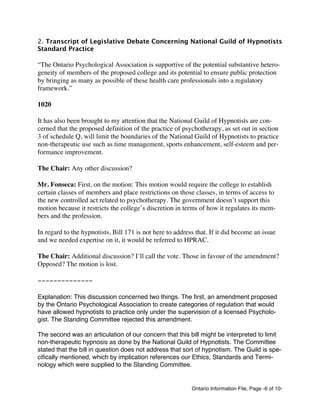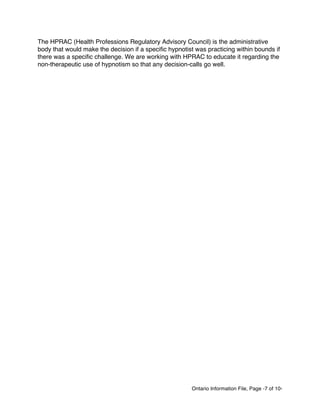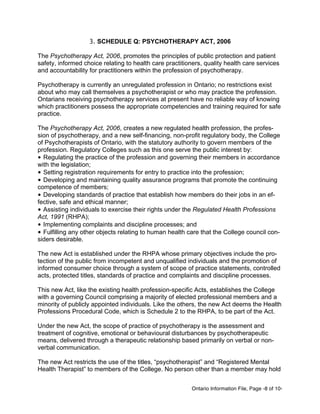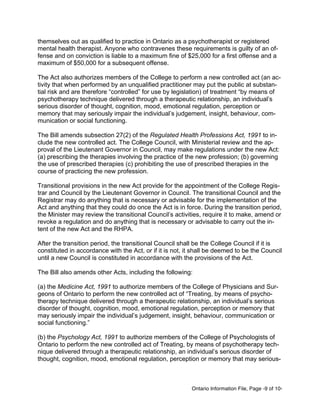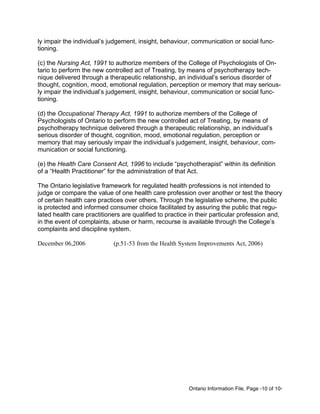Ontario Documentation file 2012 | The National Guild of Hypnotists
- 1. Ontario Information File, Page -1 of 10- Ontario Member Information File 2012 Update Introduction Legislation has passed in Ontario that may affect the way you practice hypno- tism. Rest assured that the Guild has been active in managing this situation, and that your freedom to practice has been protected. In the past we called upon our union affiliate, the National Federation of Hyp- notist to activate its resources with the Canadian Labour Congress. With their help we retained the lobbying firm of Jeffrey Lyons and Associates to assist us. Mr. Lyons has continued to provide services to us up to and including meet- ing with the Registrar of the College of Psychotherapists that administers the mental health law under the auspices of the Ontario Health Professions Regula- tory Advisory Council. At this time the College has published their draft regulations and list of profes- sional competencies. This document from the National Guild of Hypnotists is intended to familiarize our Ontario members to this new material, and to sug- gest ways to keep your practice of Consulting Hypnotism on safe legal ground. Please read it carefully. You will also find additional reference materials attached to this document which explain the psychotherapy law, the testimony regarding legislative intent and the new regulations and competencies. We also make available as PDF files the proposed new regulations from the College. They set forth the require- ments for licensure as a mental health professional. These materials are rele- vant only to those members of the National Guild of Hypnotists who plan to seek licensure.
- 2. Ontario Information File, Page -2 of 10- You should immediately download the 2012 Code of Ethics, Standards of Prac- tice and Recommended Terminology from the National Guild of Hypnotists web site. The Code of Ethics and Standards of Practice have recently been updated to change how you describe hypnotism done in connection with a medical or mental health disorder. Be sure you take note of these changes even if you have carefully practiced in accordance with the 2011 version of the Code. Description of Changes • You should make no use of language that could be construed as diag- nostic language. You should carefully use only the Recommended Termi- nology for Hypnotic Practice of the National Guild of Hypnotists. In Ontario, you will be able to continue your practice of hypnotism within Na- tional Guild of Hypnotists Standards and Terminology as an unlicensed person. However, you will have to be careful to stay within the boundaries of our Stand- ards and Terminology. This means you must carefully avoid any use of “thera- peutic” and diagnostic language. This extends even to the casual use of words like “depressed” and “anxious.” To be safe you must use the non-therapeutic equivalents described in the Recommended Terminology. Any use of diagnostic language in what you say to your client or record in your files can be deemed the unlicensed practice of psychotherapy. Our Standards and Terminology now represent part of your professional reality. As we have often said, there is no safe way for an unlicensed person to practice hypnotism other than the National Guild of Hypnotists’ way. More than ever this is now true in Ontario. • Call yourself a Consulting Hypnotist or Certified Consulting Hypnotist and what you do Consulting Hypnotism. The are only two exceptions to the “Consulting Hypnotist” title and the “Con- sulting Hypnotism” practice description. First, if you qualify for licensure as a psychotherapist under the Ontario, you may call yourself a “hypnotherapist” and what you do “hypnotherapy” after you have obtained a license. Second, if you hold a level of National Guild of Hypnotists Board Certification, you may use the title appropriate to the level you hold. These will be: Board Certified Hypnotist or Board Certified Consulting Hypnotist, Fellow of the Na- tional Guild of Hypnotists or Diplomate of the National Guild of Hypnotists.
- 3. Ontario Information File, Page -3 of 10- If you currently call what you do “hypnotherapy” we advise that you cease im- mediately. Since 2007 the National Guild of Hypnotists has cautioned that this change was inevitable. It has now arrived. The new regulations that set forth the scope of practice of licensed psychotherapy now refers generally to all psycho- therapists as therapists. The courts are not expected to distinguish between “psychotherapy” and “hypnotherapy,” and will construe “hypnotherapy” to mean “psychotherapy by means of hypnosis.” Remember that the official definition of Consulting Hypnotism is motivational coaching by means of hypnotism. It may also be held out to the public as teaching a self-help skill that allows normal people cope with normal problems in living. Common Questions Two questions are common among our membership about these matters. First, members want to know what to do when a client uses diagnostic language to describe themselves or other people. The answer is that the client may use any terminology the client wishes. The practitioner is responsible only for what the practitioner says. For example, if the client says “I am depressed,” you should act as if the client had said “I am sad.” Second, members will notice other practitioners who simply refuse to discon- tinue the use of the title “hypnotherapist” and the practice description “hypno- therapy” and want to know why they cannot do the same. The answer is that the fact that someone else is breaking the law does not mean that you can. The other party simply has not been caught. Join the Union All politicians count votes. They pay more attention to larger blocks of voters and less to smaller blocks. There are about 500 hypnotists in Ontario. There are more than 10,000 coun- selors, social workers and psychologists. As there are so few hypnotists, politicians don't consider us a meaningful "block" of votes, except to the degree that we are partnered with a larger group, such as the AFL-CIO or Canadian Labour Congress. Therefore, the best single defense of your right to practice comes from being a member of the National Federation of Hypnotists 104, the AFL-CIO and CLC affiliate of the National
- 4. Ontario Information File, Page -4 of 10- Guild of Hypnotists. You can find membership materials on the National Guild of Hypnotists website, and we urge you to join. Your Guild dues do not fund legislative and political work. All of the dues you pay to the Guild are taken up to provide the Journal of Hypnotism and the other benefits you receive. The money to pay for political and governmental work to protect hypnotists comes only from the hypnotist union, the National Federation of Hypnotists 104. All union officers serve without pay. Union dues go directly to political work. So far all of the considerable lobbying cost for Ontario (well into five figures) has been paid for by your union colleagues in the United States who are stand- ing in solidarity with you. However, they will not do this indefinitely. We will cover the Ontario situation more completely at our Ethics and Legal Is- sues program during the National Guild of Hypnotists Annual Convention in August 2012. Sincerely, C. Scot Giles, DNGH Legislative and Governmental Concerns Liaison National Federation of Hypnotists 104
- 5. Ontario Information File, Page -5 of 10- Attachments 1. Legislation History The bill in question was bill 171, an omnibus Health Care Improvement Act. The bill is huge with many sections. The section of the bill that concerned us is Sec- tion Q. This is the section that creates a new College of Psychotherapy that will regulate all providers of psychotherapy that are not already regulated. The concern was that the definition of psychotherapy in the bill was broad (“the provision of psychological intervention or interventions, delivered through a therapeutic relationship, for the treatment of cognitive, emotional or behav- ioural [sic.] disturbances"). The worry is that the Psychotherapy College might use this definition to regu- late all practice of hypnotism. The Ontario Chapter of the Canadian Society of Clinical Hypnosis (which restricts its membership to licensed health care pro- viders) specifically said they intended to argue for that interpretation. Our lobbyist was able to gain access for our Legislative Team to express this concern directly to the Standing Committee, and to educate the Committee that Consulting Hypnotists are actually motivational coaches and do not inde- pendently provide health care. The Standing Committee responded by reading into the official record a state- ment about the meaning of Section Q relative to hypnotism. They stated that unlicensed persons who practice hypnotism as motivational coaching within National Guild of Hypnotists Standards and Terminology would not be regulated by this law. The National Guild of Hypnotists and its Standards were explicitly mentioned in the official record. Under the Ontario system of government, legislative intent controls the inter- pretation of the law by the court. This means that no judge can decide that Sec- tion Q limits the right of an unlicensed person to practice hypnotism for moti- vational coaching purposes. So long as hypnotic services are not held out to the public as medicine, counseling, psychology, psychotherapy or social work, they will be lawful.
- 6. Ontario Information File, Page -6 of 10- 2. Transcript of Legislative Debate Concerning National Guild of Hypnotists Standard Practice “The Ontario Psychological Association is supportive of the potential substantive hetero- geneity of members of the proposed college and its potential to ensure public protection by bringing as many as possible of these health care professionals into a regulatory framework.” 1020 It has also been brought to my attention that the National Guild of Hypnotists are con- cerned that the proposed definition of the practice of psychotherapy, as set out in section 3 of schedule Q, will limit the boundaries of the National Guild of Hypnotists to practice non-therapeutic use such as time management, sports enhancement, self-esteem and per- formance improvement. The Chair: Any other discussion? Mr. Fonseca: First, on the motion: This motion would require the college to establish certain classes of members and place restrictions on those classes, in terms of access to the new controlled act related to psychotherapy. The government doesn’t support this motion because it restricts the college’s discretion in terms of how it regulates its mem- bers and the profession. In regard to the hypnotists, Bill 171 is not here to address that. If it did become an issue and we needed expertise on it, it would be referred to HPRAC. The Chair: Additional discussion? I’ll call the vote. Those in favour of the amendment? Opposed? The motion is lost. -------------- Explanation: This discussion concerned two things. The first, an amendment proposed by the Ontario Psychological Association to create categories of regulation that would have allowed hypnotists to practice only under the supervision of a licensed Psycholo- gist. The Standing Committee rejected this amendment. The second was an articulation of our concern that this bill might be interpreted to limit non-therapeutic hypnosis as done by the National Guild of Hypnotists. The Committee stated that the bill in question does not address that sort of hypnotism. The Guild is spe- cifically mentioned, which by implication references our Ethics, Standards and Termi- nology which were supplied to the Standing Committee.
- 7. Ontario Information File, Page -7 of 10- The HPRAC (Health Professions Regulatory Advisory Council) is the administrative body that would make the decision if a specific hypnotist was practicing within bounds if there was a specific challenge. We are working with HPRAC to educate it regarding the non-therapeutic use of hypnotism so that any decision-calls go well.
- 8. Ontario Information File, Page -8 of 10- 3. SCHEDULE Q: PSYCHOTHERAPY ACT, 2006 The Psychotherapy Act, 2006, promotes the principles of public protection and patient safety, informed choice relating to health care practitioners, quality health care services and accountability for practitioners within the profession of psychotherapy. Psychotherapy is currently an unregulated profession in Ontario; no restrictions exist about who may call themselves a psychotherapist or who may practice the profession. Ontarians receiving psychotherapy services at present have no reliable way of knowing which practitioners possess the appropriate competencies and training required for safe practice. The Psychotherapy Act, 2006, creates a new regulated health profession, the profes- sion of psychotherapy, and a new self-financing, non-profit regulatory body, the College of Psychotherapists of Ontario, with the statutory authority to govern members of the profession. Regulatory Colleges such as this one serve the public interest by: • Regulating the practice of the profession and governing their members in accordance with the legislation; • Setting registration requirements for entry to practice into the profession; • Developing and maintaining quality assurance programs that promote the continuing competence of members; • Developing standards of practice that establish how members do their jobs in an ef- fective, safe and ethical manner; • Assisting individuals to exercise their rights under the Regulated Health Professions Act, 1991 (RHPA); • Implementing complaints and discipline processes; and • Fulfilling any other objects relating to human health care that the College council con- siders desirable. The new Act is established under the RHPA whose primary objectives include the pro- tection of the public from incompetent and unqualified individuals and the promotion of informed consumer choice through a system of scope of practice statements, controlled acts, protected titles, standards of practice and complaints and discipline processes. This new Act, like the existing health profession-specific Acts, establishes the College with a governing Council comprising a majority of elected professional members and a minority of publicly appointed individuals. Like the others, the new Act deems the Health Professions Procedural Code, which is Schedule 2 to the RHPA, to be part of the Act. Under the new Act, the scope of practice of psychotherapy is the assessment and treatment of cognitive, emotional or behavioural disturbances by psychotherapeutic means, delivered through a therapeutic relationship based primarily on verbal or non- verbal communication. The new Act restricts the use of the titles, “psychotherapist” and “Registered Mental Health Therapist” to members of the College. No person other than a member may hold
- 9. Ontario Information File, Page -9 of 10- themselves out as qualified to practice in Ontario as a psychotherapist or registered mental health therapist. Anyone who contravenes these requirements is guilty of an of- fense and on conviction is liable to a maximum fine of $25,000 for a first offense and a maximum of $50,000 for a subsequent offense. The Act also authorizes members of the College to perform a new controlled act (an ac- tivity that when performed by an unqualified practitioner may put the public at substan- tial risk and are therefore “controlled” for use by legislation) of treatment “by means of psychotherapy technique delivered through a therapeutic relationship, an individual’s serious disorder of thought, cognition, mood, emotional regulation, perception or memory that may seriously impair the individual’s judgement, insight, behaviour, com- munication or social functioning. The Bill amends subsection 27(2) of the Regulated Health Professions Act, 1991 to in- clude the new controlled act. The College Council, with Ministerial review and the ap- proval of the Lieutenant Governor in Council, may make regulations under the new Act: (a) prescribing the therapies involving the practice of the new profession; (b) governing the use of prescribed therapies (c) prohibiting the use of prescribed therapies in the course of practicing the new profession. Transitional provisions in the new Act provide for the appointment of the College Regis- trar and Council by the Lieutenant Governor in Council. The transitional Council and the Registrar may do anything that is necessary or advisable for the implementation of the Act and anything that they could do once the Act is in force. During the transition period, the Minister may review the transitional Council’s activities, require it to make, amend or revoke a regulation and do anything that is necessary or advisable to carry out the in- tent of the new Act and the RHPA. After the transition period, the transitional Council shall be the College Council if it is constituted in accordance with the Act, or if it is not, it shall be deemed to be the Council until a new Council is constituted in accordance with the provisions of the Act. The Bill also amends other Acts, including the following: (a) the Medicine Act, 1991 to authorize members of the College of Physicians and Sur- geons of Ontario to perform the new controlled act of “Treating, by means of psycho- therapy technique delivered through a therapeutic relationship, an individual’s serious disorder of thought, cognition, mood, emotional regulation, perception or memory that may seriously impair the individual’s judgement, insight, behaviour, communication or social functioning.” (b) the Psychology Act, 1991 to authorize members of the College of Psychologists of Ontario to perform the new controlled act of Treating, by means of psychotherapy tech- nique delivered through a therapeutic relationship, an individual’s serious disorder of thought, cognition, mood, emotional regulation, perception or memory that may serious-
- 10. Ontario Information File, Page -10 of 10- ly impair the individual’s judgement, insight, behaviour, communication or social func- tioning. (c) the Nursing Act, 1991 to authorize members of the College of Psychologists of On- tario to perform the new controlled act of Treating, by means of psychotherapy tech- nique delivered through a therapeutic relationship, an individual’s serious disorder of thought, cognition, mood, emotional regulation, perception or memory that may serious- ly impair the individual’s judgement, insight, behaviour, communication or social func- tioning. (d) the Occupational Therapy Act, 1991 to authorize members of the College of Psychologists of Ontario to perform the new controlled act of Treating, by means of psychotherapy technique delivered through a therapeutic relationship, an individual’s serious disorder of thought, cognition, mood, emotional regulation, perception or memory that may seriously impair the individual’s judgement, insight, behaviour, com- munication or social functioning. (e) the Health Care Consent Act, 1996 to include “psychotherapist” within its definition of a “Health Practitioner” for the administration of that Act. The Ontario legislative framework for regulated health professions is not intended to judge or compare the value of one health care profession over another or test the theory of certain health care practices over others. Through the legislative scheme, the public is protected and informed consumer choice facilitated by assuring the public that regu- lated health care practitioners are qualified to practice in their particular profession and, in the event of complaints, abuse or harm, recourse is available through the College’s complaints and discipline system. December 06,2006 (p.51-53 from the Health System Improvements Act, 2006)

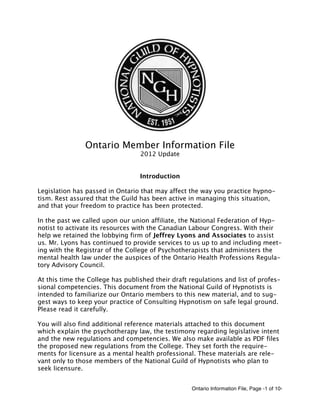
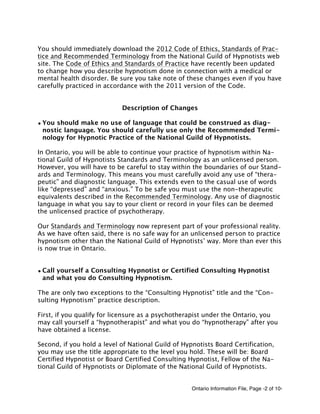
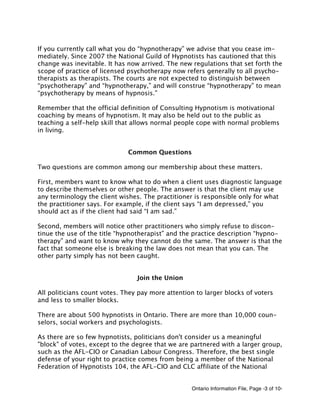
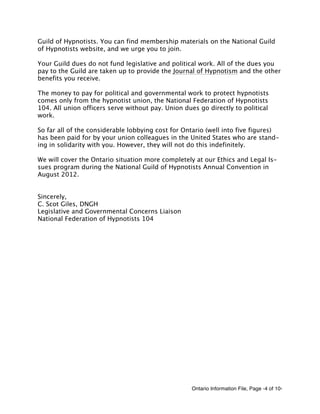
![Ontario Information File, Page -5 of 10-
Attachments
1. Legislation History
The bill in question was bill 171, an omnibus Health Care Improvement Act. The
bill is huge with many sections. The section of the bill that concerned us is Sec-
tion Q. This is the section that creates a new College of Psychotherapy that will
regulate all providers of psychotherapy that are not already regulated.
The concern was that the definition of psychotherapy in the bill was broad (“the
provision of psychological intervention or interventions, delivered through a
therapeutic relationship, for the treatment of cognitive, emotional or behav-
ioural [sic.] disturbances").
The worry is that the Psychotherapy College might use this definition to regu-
late all practice of hypnotism. The Ontario Chapter of the Canadian Society of
Clinical Hypnosis (which restricts its membership to licensed health care pro-
viders) specifically said they intended to argue for that interpretation.
Our lobbyist was able to gain access for our Legislative Team to express this
concern directly to the Standing Committee, and to educate the Committee that
Consulting Hypnotists are actually motivational coaches and do not inde-
pendently provide health care.
The Standing Committee responded by reading into the official record a state-
ment about the meaning of Section Q relative to hypnotism.
They stated that unlicensed persons who practice hypnotism as motivational
coaching within National Guild of Hypnotists Standards and Terminology would
not be regulated by this law. The National Guild of Hypnotists and its Standards
were explicitly mentioned in the official record.
Under the Ontario system of government, legislative intent controls the inter-
pretation of the law by the court. This means that no judge can decide that Sec-
tion Q limits the right of an unlicensed person to practice hypnotism for moti-
vational coaching purposes. So long as hypnotic services are not held out to the
public as medicine, counseling, psychology, psychotherapy or social work, they
will be lawful.](https://image.slidesharecdn.com/ontariodocumentationfile2012-130704155643-phpapp02/85/Ontario-Documentation-file-2012-The-National-Guild-of-Hypnotists-5-320.jpg)
